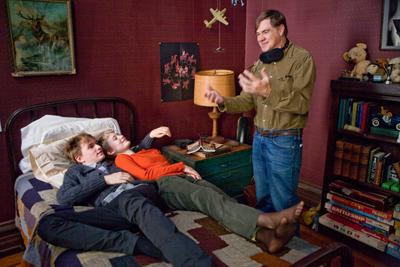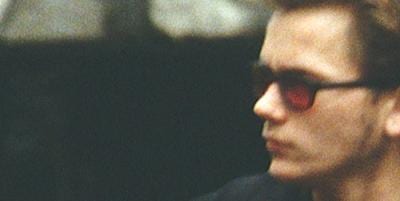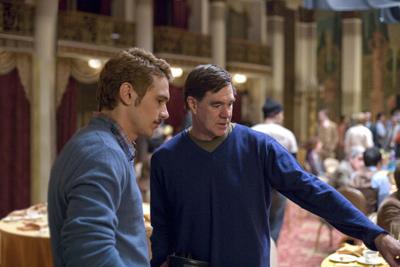
"It's always great to use people who haven't been seen by the public," says director Gus Van Sant, seen here on the set of Restless.

River Phoenix from the filming of Van Sant's My Own Private Idaho.
It’s fair to say that pop culture is mostly about buying and selling the appeal of youth. One filmmaker has devoted most of his cinematic career to depicting young people in sophisticated and stirring ways that defy the contrived and artificial portrayals we are fed most often.
Though he has not given the cold shoulder to more commercial fare — Good Will Hunting, Milk, To Die For — director Gus Van Sant has mostly favoured small-scale, atypical, intimate projects. Regardless of budget, though, he has, over the last quarter century, consistently told gritty stories of marginalized youth, whether they be disillusioned, disaffected or just plain angry.
His poignant 1991 Shakespearean masterpiece, My Own Private Idaho, about two vagabond hustler friends (Keanu Reeves and the late River Phoenix) on a quest to find Phoenix’s mother, is especially resonant with gay audiences. And 2003’s impressionistic Elephant is a strikingly beautiful if haunting exploration of the impenetrable mysteries of youth in the wake of the Columbine shootings.
Van Sant has always shown a clear preference for casting unknown young actors and fresh faces still searching for their breakout roles. When we met at Toronto’s Intercontinental Hotel during this year’s Toronto International Film Festival, I asked him what draws him to actors with little or no experience. “It’s always great to use people who haven’t been seen by the public,” says the soft-spoken director. “Then you can go into the story and you won’t be watching a character you’ve seen before.”
In Restless, as with Mala Noche, My Own Private Idaho and Good Will Hunting, Van Sant’s male lead reaches a difficult crossroads. “I guess the coming-of-age story is almost a convention, telling your story through the eyes of a 17-year-old, so that character is seeing the world in a fresh way, just like the audience.”
His male characters often project a more subtle and ambiguous brand of masculinity, one clearly at odds with that so often depicted in mainstream cinema. “A lot of the time in mainstream films, you’re setting up your lead character to be some kind of hero, so you’re showing them saving a cat from drowning, or stopping a bully from teasing somebody else,” says Van Sant. “They’re doing something heroic, which I think is a request from the audience, but also the filmmaker or executives. Why do we like this guy? Oh yeah, because he stands up to bullies, and he likes pretty girls. They’re trying to bond the audience to the character. I’m usually not trying to do that. You’ll like my character because he’s himself, not because he has these traits.”
Restless, his latest film, follows angsty Enoch Brae (Henry Hopper, son of actor Dennis Hopper), a wayward kid who crashes funerals as a hobby while struggling with his parents’ sudden deaths. At one such funeral, Enoch takes an instant liking to the terminally ill charmer Annabel Cotton (Mia Wasikowska). The two embark on a seemingly doomed romance.
Enoch and Annabel find themselves wrestling with mortality much earlier in their lives than most people have to. But for Van Sant, there’s nothing extraordinary about finding young characters struggling with grave matters. “Usually, I think of a young person in general as having a pretty perceptive view of the world. So it’s usually the adults who have a less wise perception, at least in my reality.”
What resonates while watching Restless is another theme echoed throughout most of Van Sant’s films: the longing to find a home, a surrogate family and to participate in a community. “I guess that’s partly because when I was young, my family moved around a lot, so I made groups of friends once a year or once every two years in different places in the United States. So I think I’ve just latched onto that as a story. That’s kind of the most common story that I’m retelling. An ad hoc, makeshift or adopted family… and it happens in pretty much every film. And friendships are usually new little families, and I guess it just sort of happens in my life, or else it’s a storytelling aspect I’m attracted to, because I relate to it.”

 Why you can trust Xtra
Why you can trust Xtra


